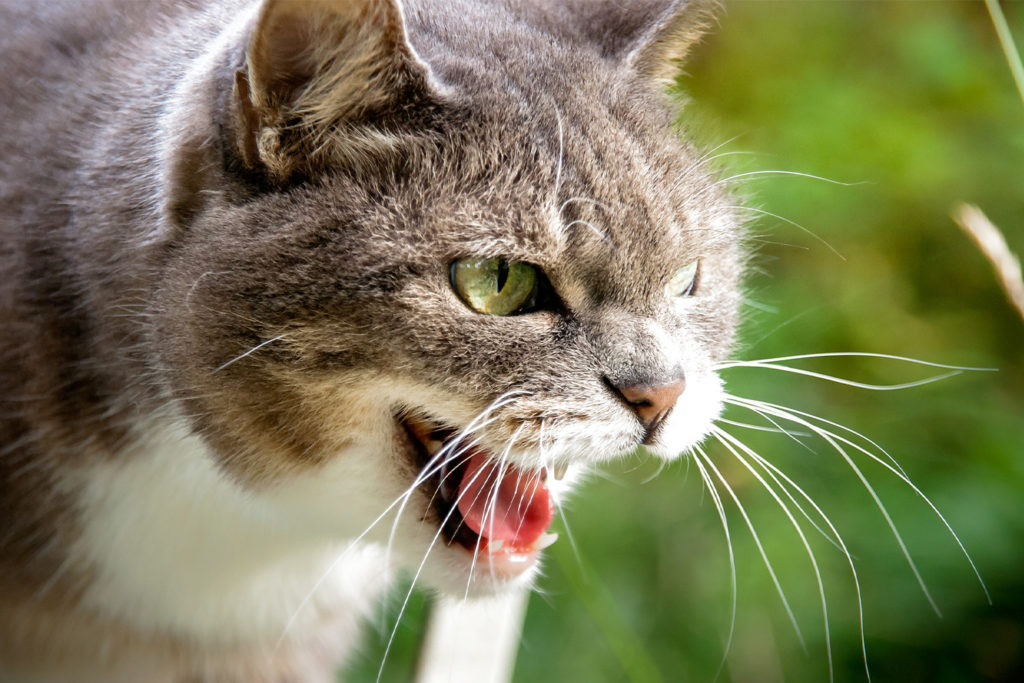Your cat may be hissing at your new kitten as a natural response to territorial issues. Introducing a new kitten into a household can disrupt the established hierarchy and trigger territorial instincts in your older cat, leading to hissing behavior.
Cats use hissing as a way to establish dominance or to protect their space. It is crucial to provide your older cat with a safe and separate space initially and gradually introduce them to the new kitten through scent swapping and supervised interactions.
This will help them adjust to each other’s presence and reduce aggression. Additionally, ensure that both cats have their own resources (such as food, litter boxes, and resting areas) to avoid competition and potential conflicts.
Establishing Territory: A Cat’s Perspective
Establishing territory is a natural behavior for cats, and it is not uncommon for them to hiss at a new kitten. Cats are territorial animals, and they use various methods to mark their territory and create boundaries.
When a new kitten is introduced into the household, the resident cat may feel threatened and see the newcomer as an intruder. In response, the resident cat may hiss as a way of warning the new kitten to stay away.
Cats use their sense of smell to mark their territory. They have scent glands on their paws, face, and body, and they leave pheromones in their urine as territorial markers. Hissing is a vocal warning signal that serves to reinforce these scent-based territorial markings.
It is important for cat owners to understand that hissing is a normal feline behavior and should not be discouraged, unless it escalates into aggression. In most cases, with time and proper introductions, the resident cat and the new kitten will learn to tolerate and even enjoy each other’s company.
Introducing A New Kitten: Potential Challenges
Introducing a new kitten to a household with existing cats can be a delicate process. Cats’ initial reaction to the presence of a new kitten can include hissing and aggression. This behavior is a natural response to the intrusion of a new cat into their territory.
To ensure a smoother transition, it is crucial to follow a gradual introduction process. The importance of a gradual introduction process cannot be overstated. Start by keeping the new kitten separated in a separate room, allowing your existing cats to become familiar with the kitten’s scent through door sniffing.
Once initial curiosity subsides, you can proceed to supervised face-to-face interactions. Make sure to monitor body language and intervene if necessary. Provide each cat with their own safe space and resources for personal retreat if needed.
Remember, patience and understanding are essential during this adjustment period. Over time, with consistent positive experiences, the hissing and aggression should diminish, paving the way for a harmonious feline household.
The Hissing Response: What Does It Mean?
The purpose of hissing as a warning signal is a crucial aspect of feline communication. When cats encounter a new kitten, they may resort to hissing as a way to express their discomfort or establish boundaries. Understanding the differentiating factors between fear, aggression, and stress can shed light on this behavior.
Hissing, in this context, is usually a defensive response triggered by fear. The older cat may perceive the new kitten as a potential threat or intrusion into its territory. By hissing, the older cat tries to warn and deter the new kitten, asserting its dominance and establishing boundaries. The goal is to maintain control over its environment and protect itself from potential danger.
It is crucial to create a gradual introduction process between the older cat and the new kitten, allowing them to adapt to each other’s presence. This can help minimize fear, aggression, and stress, facilitating a more harmonious relationship between the two feline companions.

Credit: kongclub.app
Reasons For Hissing At New Kittens
There are several reasons why your cat may be hissing at your new kitten. One reason could be fear and uncertainty of the unknown. Cats are creatures of habit and can become anxious or stressed when there are changes in their environment. The new kitten may represent a threat to their established routine, causing them to display defensive behaviors such as hissing.
Another reason for hissing could be the cat’s natural instinct to protect resources and maintain control. Cats are territorial animals and may feel threatened by the presence of a new kitten invading their space. They may hiss as a way to assert dominance and protect their possessions, such as food, toys, and sleeping areas.
Hissing can also be a way for the cat to establish dominance and hierarchy within the household. Cats have a social structure and may need to determine their place in the hierarchy when a new kitten is introduced. Hissing can be a way for them to communicate their status and boundaries to the new addition.
Tips For Managing The Hissing Behavior
One of the most common challenges when introducing a new kitten to a resident cat is dealing with hissing behavior. It’s important to understand that hissing is a normal part of the adjustment process, and with patience and proper management, it can be resolved.
Providing separate spaces and resources for each cat is crucial. This allows them to have their own territory and reduces the potential for conflicts. Make sure each cat has its own litter box, food, and water bowls, as well as quiet spaces to retreat to.
Gradually introducing scents and visual access is another vital step. Swap bedding or use a pheromone diffuser to help familiarize both cats with each other’s scent. Gradually allow visual access through baby gates or cracked doors. Monitor their reactions and proceed at their own pace.
Utilizing positive reinforcement and rewards during interactions helps create positive associations. Reward both cats for calm behavior and encourage play sessions together using toys or treats. This helps them associate each other’s presence with positive experiences.
Facilitating Positive Interactions
Introducing a new kitten into a household with an existing cat can sometimes lead to hissing behavior. To facilitate positive interactions between the two animals, it’s important to encourage supervised play and positive experiences. By setting up controlled introductions, you can ensure that both cats are comfortable with each other’s presence. Allow them to interact in short bursts, starting with separate spaces and gradually increasing their exposure to each other. Use calming aids and pheromone products, such as diffusers or sprays, to create a soothing environment. These products can help reduce stress and anxiety for both cats, promoting a more harmonious relationship. If the hissing persists or escalates, it may be beneficial to seek professional advice from a veterinarian or an animal behaviorist. They can provide expert guidance on how to address specific issues and help facilitate a peaceful coexistence between your new kitten and resident cat.
Conclusion
As a cat owner, it can be disheartening to witness your beloved feline hissing at a new kitten. However, it’s important to understand that this behavior is not uncommon and can be attributed to several factors, including territorial instinct and fear.
By gradually introducing the cats, providing them with separate spaces, and allowing natural interactions, you can help them develop a positive relationship over time. Remember, patience and understanding are key when it comes to integrating a new kitten into your cat’s home.


